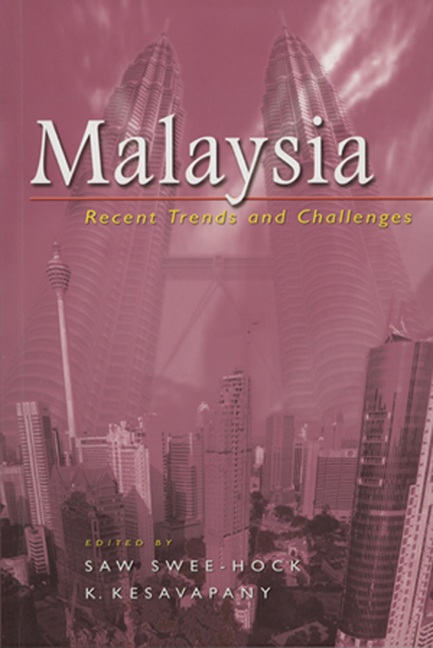Book contents
- Frontmatter
- Content
- Preface
- Foreword
- Contributors
- 1 Population Trends and Patterns in Multiracial Malaysia
- 2 The Emerging Politics of Islam Hadhari
- 3 Bangsa Malaysia: Vision or Spin?
- 4 The 2004 Malaysian General Elections: Economic Development, Electoral Trends, and the Decline of the Opposition
- 5 The UMNO-PAS Struggle: Analysis of PAS's Defeat in 2004
- 6 The Malay Electorate in 2004: Reversing the 1999 Result?
- 7 UMNO and BN in the 2004 Election: The Political Culture of Complex Identities
- 8 Malaysia's Civil Service Reform: Mahathir's Legacies and Abdullah's Challenges
- 9 Reinventing Governance in Corporate Malaysia: The Challenges Ahead
- 10 Globalisation and Ethnic Integration in Malaysian Education
- 11 Globalisation and the Challenges Facing Malaysia's Economy
- 12 Promising Start to Malaysia-Singapore Relations
- Bibliography
- Index
Foreword
Published online by Cambridge University Press: 21 October 2015
- Frontmatter
- Content
- Preface
- Foreword
- Contributors
- 1 Population Trends and Patterns in Multiracial Malaysia
- 2 The Emerging Politics of Islam Hadhari
- 3 Bangsa Malaysia: Vision or Spin?
- 4 The 2004 Malaysian General Elections: Economic Development, Electoral Trends, and the Decline of the Opposition
- 5 The UMNO-PAS Struggle: Analysis of PAS's Defeat in 2004
- 6 The Malay Electorate in 2004: Reversing the 1999 Result?
- 7 UMNO and BN in the 2004 Election: The Political Culture of Complex Identities
- 8 Malaysia's Civil Service Reform: Mahathir's Legacies and Abdullah's Challenges
- 9 Reinventing Governance in Corporate Malaysia: The Challenges Ahead
- 10 Globalisation and Ethnic Integration in Malaysian Education
- 11 Globalisation and the Challenges Facing Malaysia's Economy
- 12 Promising Start to Malaysia-Singapore Relations
- Bibliography
- Index
Summary
I am very pleased to have been invited to take part in the one-day workshop on “The Political Economy of Malaysia: Current Trends and Future Challenges” held at the Institute of Southeast Asian Studies, Singapore, in September 2004. Most of the papers were by scholars from Malaysia and Singapore who were still very young at the time when Singapore was separated from the Federation of Malaysia. They would not have had the searing experience of the tensions that led the two to separate in 1965, but both have lived through some of the consequences of that separation and are now able to examine coolly the most recent manifestations of what I see as the “one plural society, two countries, two systems” syndrome. There have certainly been many ups and downs in that bifocal effect for the past 40 years.
After an absence of 28 years, I returned in 1996 to the plural society in which I had grown up, from where I had received my education and where I had taught for ten exhilarating years. This was on the eve of the financial crisis that badly hurt the region. That crisis contributed to the tense relationship between Malaysia and Singapore for the next seven years, although among observers, some of the issues seemed unnecessarily discordant. Only on the rare occasions when scholars of both countries came together to discuss the issues in dispute, often at the Institute of Southeast Asian Studies (ISEAS), was I reminded of the underlying oneness of all the protagonists concerned. The workshop in 2004 that led to this volume of essays was an exceptionally warm gathering of like-minded authors who rejoiced at the restored friendliness between the two countries. It had, of course, as everyone commented, much to do with the fresh tone of the administration under the new prime minister, Datuk Seri Abdullah Badawi. The 11 months before the workshop had seen a marked improvement in the way various leaders of the two countries had begun to conduct diplomacy with one another. The changes are outlined in the last chapter in this volume by the Director of ISEAS, K. Kesavapany, who also recalls for us what he knows only too well: how it felt during those difficult years before he joined ISEAS, when he served as Singapore's High Commissioner to Malaysia.
- Type
- Chapter
- Information
- MalaysiaRecent Trends and Challenges, pp. viii - xPublisher: ISEAS–Yusof Ishak InstitutePrint publication year: 2005



